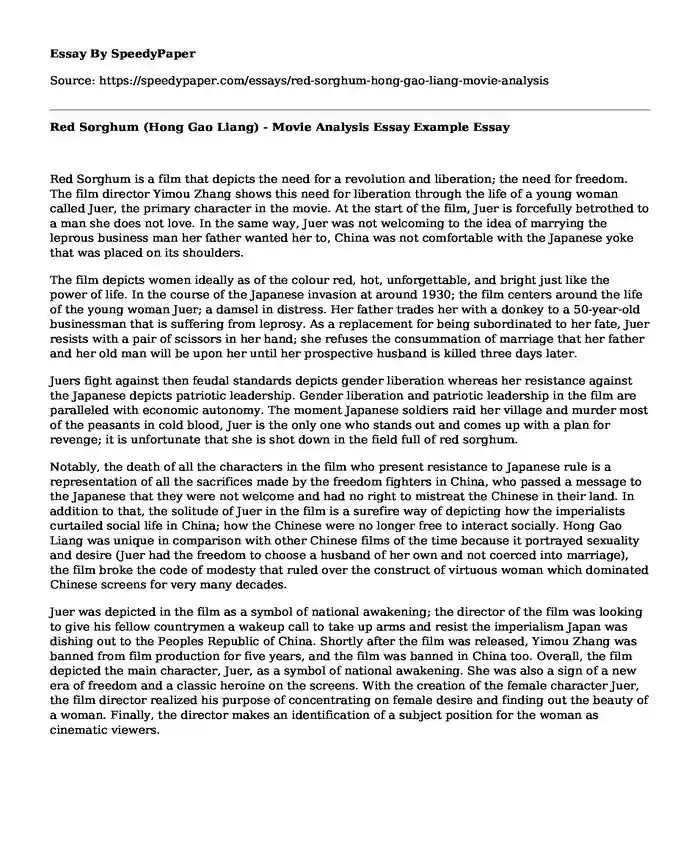Red Sorghum is a film that depicts the need for a revolution and liberation; the need for freedom. The film director Yimou Zhang shows this need for liberation through the life of a young woman called Juer, the primary character in the movie. At the start of the film, Juer is forcefully betrothed to a man she does not love. In the same way, Juer was not welcoming to the idea of marrying the leprous business man her father wanted her to, China was not comfortable with the Japanese yoke that was placed on its shoulders.
The film depicts women ideally as of the colour red, hot, unforgettable, and bright just like the power of life. In the course of the Japanese invasion at around 1930; the film centers around the life of the young woman Juer; a damsel in distress. Her father trades her with a donkey to a 50-year-old businessman that is suffering from leprosy. As a replacement for being subordinated to her fate, Juer resists with a pair of scissors in her hand; she refuses the consummation of marriage that her father and her old man will be upon her until her prospective husband is killed three days later.
Juers fight against then feudal standards depicts gender liberation whereas her resistance against the Japanese depicts patriotic leadership. Gender liberation and patriotic leadership in the film are paralleled with economic autonomy. The moment Japanese soldiers raid her village and murder most of the peasants in cold blood, Juer is the only one who stands out and comes up with a plan for revenge; it is unfortunate that she is shot down in the field full of red sorghum.
Notably, the death of all the characters in the film who present resistance to Japanese rule is a representation of all the sacrifices made by the freedom fighters in China, who passed a message to the Japanese that they were not welcome and had no right to mistreat the Chinese in their land. In addition to that, the solitude of Juer in the film is a surefire way of depicting how the imperialists curtailed social life in China; how the Chinese were no longer free to interact socially. Hong Gao Liang was unique in comparison with other Chinese films of the time because it portrayed sexuality and desire (Juer had the freedom to choose a husband of her own and not coerced into marriage), the film broke the code of modesty that ruled over the construct of virtuous woman which dominated Chinese screens for very many decades.
Juer was depicted in the film as a symbol of national awakening; the director of the film was looking to give his fellow countrymen a wakeup call to take up arms and resist the imperialism Japan was dishing out to the Peoples Republic of China. Shortly after the film was released, Yimou Zhang was banned from film production for five years, and the film was banned in China too. Overall, the film depicted the main character, Juer, as a symbol of national awakening. She was also a sign of a new era of freedom and a classic heroine on the screens. With the creation of the female character Juer, the film director realized his purpose of concentrating on female desire and finding out the beauty of a woman. Finally, the director makes an identification of a subject position for the woman as cinematic viewers.
Cite this page
Red Sorghum (Hong Gao Liang) - Movie Analysis Essay Example. (2019, Nov 25). Retrieved from https://speedypaper.com/essays/red-sorghum-hong-gao-liang-movie-analysis
Request Removal
If you are the original author of this essay and no longer wish to have it published on the SpeedyPaper website, please click below to request its removal:
- Social Work Admission Essay Sample
- Essay Sample on Witches Loaves by O'Henry
- Arbitration Clauses, Law Essay Sample
- Free Essay on Laboratory Information Management Systems
- Environment Essay Example: Ocean Plastics
- Management at Walmart - Free Essay Example
- Article Analysis Essay on Literacy in Language and Mathematics
Popular categories





